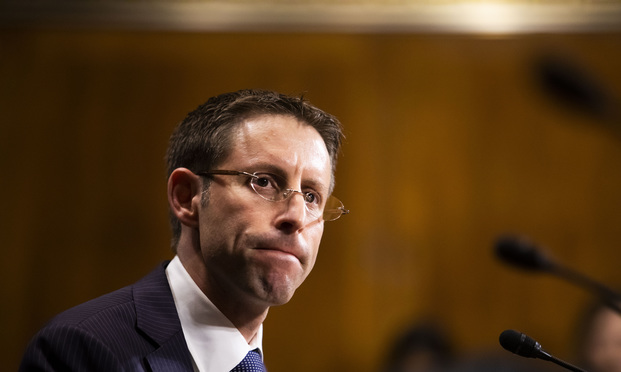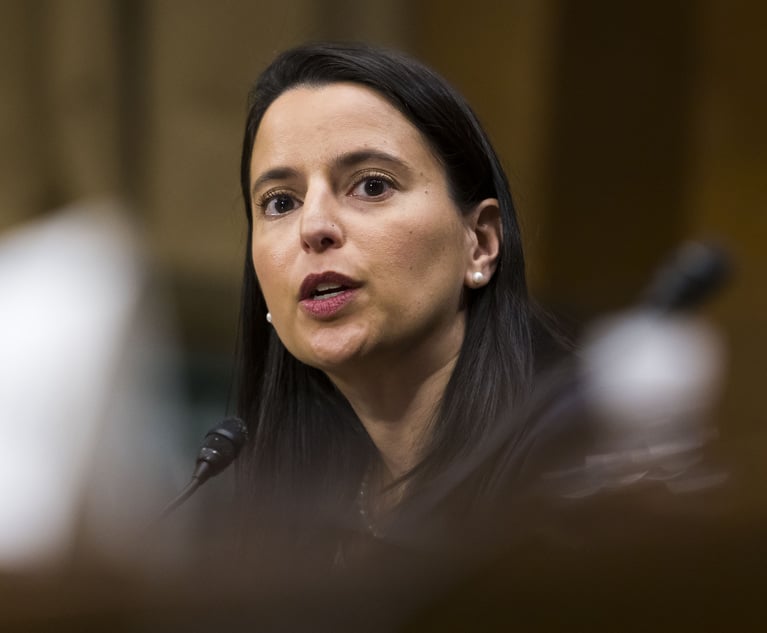'Bad Day for the Separation of Powers': Trump Appointee Says 9th Circuit Blocked an Immigration Policy That's Constitutional
Ninth Circuit Judge Daniel Bress said his colleagues' decision denying the federal government's motion to stay an injunction in a case over a presidential proclamation requiring certain migrants to enter the U.S. with an approved health plan is "yet the latest example of our court allowing a universal injunction of a clearly constitutional Executive Branch immigration policy."
May 04, 2020 at 04:38 PM
3 minute read
 Daniel Bress testifies before the Senate Judiciary Committee during his confirmation hearing to be U.S. circuit judge for the Ninth Circuit Court of Appeals on May 22, 2019. Photo by Diego Raszinschi
Daniel Bress testifies before the Senate Judiciary Committee during his confirmation hearing to be U.S. circuit judge for the Ninth Circuit Court of Appeals on May 22, 2019. Photo by Diego Raszinschi
A divided panel of the U.S. Court of Appeals for the Ninth Circuit denied the Trump administration's attempt to stay an injunction that halts enforcement of a presidential proclamation restricting certain immigrants from entering the U.S. without an approved health insurance plan.
In Monday's decision, however, recent Trump Ninth Circuit appointee Judge Daniel Bress dissented, saying that the court gave deference "to everyone but the President."
The government sought a motion to stay a preliminary injunction blocking the October proclamation, which the administration has said aims to reduce the costs of providing health care to uninsured individuals. In a majority opinion written by Chief Judge Sidney Thomas, and joined by Judge Marsha Berzon, the court found that the government did not establish the necessary irreparable harm to justify their motion to stay the injunction, which was issued by a trial judge in the U.S. District Court for the District of Oregon in November.
"Even if we credit the Proclamation's assertions, the government has not demonstrated that the healthcare system will be irreparably burdened while this appeal is pending," Thomas wrote. "The record evidence shows that many of the immigrants affected by the Proclamation could obtain some form of insurance that would reduce their already minimal contribution to healthcare costs, but these immigrants are nonetheless inadmissible under the Proclamation because they cannot obtain an 'approved' health insurance plan or cannot obtain a plan within the 30-day deadline."
Naomi Igra, of Sidley Austin in San Francisco, argued the case for the appellees and did not respond to a request for comment Monday afternoon. Plaintiffs were also represented by attorneys from The Justice Action Center in Los Angeles and the Innovation Law Lab in Portland, Oregon.
In his dissent, Bress said the decision is "yet the latest example of our court allowing a universal injunction of a clearly constitutional Executive Branch immigration policy."
"There is no legal basis to impose novel and unjustified restrictions on what the Supreme Court has described as 'the President['s] sweeping authority to decide whether to suspend entry, whose entry to suspend, and for how long," wrote Bress, citing Trump v. Hawaii, a 2017 Supreme Court decision that found President Donald Trump lawfully used his authority to suspend entry of migrants into the U.S.
"Yet the majority opinion gives deference to everyone but the President—the district court, whose analysis was deeply flawed; States who joined an amicus brief and who are not even parties to this case; and plaintiffs' expert, Dr. Leighton Ku, who candidly admits he performed 'not an ideal analysis,'" Bress wrote.
Bress said that policy debates should be resolved in Congress, the public square or the ballot box, not a district court or panel of judges in San Francisco.
"It is a bad day for the separation of powers when the Executive—operating at the apex of his constitutional mandate—loses out to players who lack the authority that the Constitution and Congress entrusted to him," he said.
This content has been archived. It is available through our partners, LexisNexis® and Bloomberg Law.
To view this content, please continue to their sites.
Not a Lexis Subscriber?
Subscribe Now
Not a Bloomberg Law Subscriber?
Subscribe Now
NOT FOR REPRINT
© 2025 ALM Global, LLC, All Rights Reserved. Request academic re-use from www.copyright.com. All other uses, submit a request to [email protected]. For more information visit Asset & Logo Licensing.
You Might Like
View All
Hogan Lovells, Jenner & Block Challenge Trump EOs Impacting Gender-Affirming Care
3 minute read
Latham Adds Former Treasury Department Lawyer for Cross-Border Deal Guidance
2 minute read
Zoom Faces Intellectual Property Suit Over AI-Based Augmented Video Conferencing
3 minute readLaw Firms Mentioned
Trending Stories
- 1Buyer Beware:Continuity of Coverage in Legal Malpractice Insurance
- 2‘Listen, Listen, Listen’: Some Practice Tips From Judges in the Oakland Federal Courthouse
- 3BCLP Joins Saudi Legal Market with Plans to Open Two Offices
- 4White & Case Crosses $4M in PEP, $3B in Revenue in 'Breakthrough Year'
- 5Thursday Newspaper
Who Got The Work
J. Brugh Lower of Gibbons has entered an appearance for industrial equipment supplier Devco Corporation in a pending trademark infringement lawsuit. The suit, accusing the defendant of selling knock-off Graco products, was filed Dec. 18 in New Jersey District Court by Rivkin Radler on behalf of Graco Inc. and Graco Minnesota. The case, assigned to U.S. District Judge Zahid N. Quraishi, is 3:24-cv-11294, Graco Inc. et al v. Devco Corporation.
Who Got The Work
Rebecca Maller-Stein and Kent A. Yalowitz of Arnold & Porter Kaye Scholer have entered their appearances for Hanaco Venture Capital and its executives, Lior Prosor and David Frankel, in a pending securities lawsuit. The action, filed on Dec. 24 in New York Southern District Court by Zell, Aron & Co. on behalf of Goldeneye Advisors, accuses the defendants of negligently and fraudulently managing the plaintiff's $1 million investment. The case, assigned to U.S. District Judge Vernon S. Broderick, is 1:24-cv-09918, Goldeneye Advisors, LLC v. Hanaco Venture Capital, Ltd. et al.
Who Got The Work
Attorneys from A&O Shearman has stepped in as defense counsel for Toronto-Dominion Bank and other defendants in a pending securities class action. The suit, filed Dec. 11 in New York Southern District Court by Bleichmar Fonti & Auld, accuses the defendants of concealing the bank's 'pervasive' deficiencies in regards to its compliance with the Bank Secrecy Act and the quality of its anti-money laundering controls. The case, assigned to U.S. District Judge Arun Subramanian, is 1:24-cv-09445, Gonzalez v. The Toronto-Dominion Bank et al.
Who Got The Work
Crown Castle International, a Pennsylvania company providing shared communications infrastructure, has turned to Luke D. Wolf of Gordon Rees Scully Mansukhani to fend off a pending breach-of-contract lawsuit. The court action, filed Nov. 25 in Michigan Eastern District Court by Hooper Hathaway PC on behalf of The Town Residences LLC, accuses Crown Castle of failing to transfer approximately $30,000 in utility payments from T-Mobile in breach of a roof-top lease and assignment agreement. The case, assigned to U.S. District Judge Susan K. Declercq, is 2:24-cv-13131, The Town Residences LLC v. T-Mobile US, Inc. et al.
Who Got The Work
Wilfred P. Coronato and Daniel M. Schwartz of McCarter & English have stepped in as defense counsel to Electrolux Home Products Inc. in a pending product liability lawsuit. The court action, filed Nov. 26 in New York Eastern District Court by Poulos Lopiccolo PC and Nagel Rice LLP on behalf of David Stern, alleges that the defendant's refrigerators’ drawers and shelving repeatedly break and fall apart within months after purchase. The case, assigned to U.S. District Judge Joan M. Azrack, is 2:24-cv-08204, Stern v. Electrolux Home Products, Inc.
Featured Firms
Law Offices of Gary Martin Hays & Associates, P.C.
(470) 294-1674
Law Offices of Mark E. Salomone
(857) 444-6468
Smith & Hassler
(713) 739-1250







